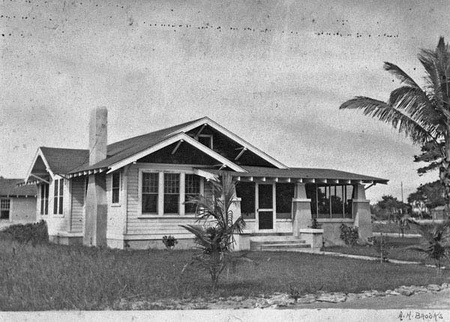Morikami Sukeji, who came to America as a member of the Yamato Colony in South Florida and remained there alone until the end of his life after the colony was dissolved, continued to write letters to his sister-in-law and her family after the war. Looking back on his days after settling in the United States, he shares untold stories of his unfortunate engagement and reports on the large fortune he made during the real estate boom.
* * * * *
Month/Day/1950
<Obon and New Year together>
Ms. Mi.
What an auspicious day today is. I received a nostalgic letter and a long-awaited photograph, and it was as if Obon and New Year had come at the same time. Your children have all grown up and I can see how hard you have worked. I never expected you to look so young and beautiful, and this morning, as I was gazing at the photograph at the post office, my good friend Aaron Smack suddenly asked me, "Hey, whose photograph is this? Who is this Japanese woman?"
"This is my late brother's wife whom I told you about before. How old does she look to you?" I asked, and he immediately said she was 27 or 28 years old. When I told him the truth, he didn't believe me. He said, "Japan must be suffering, so please call her over here." Americans are innocent and seem to say whatever they think.
* * * * *
Do you smoke, Mi-san? It's not uncommon for ladies here to smoke. It's a kind of fashion. There's nothing bad to see young ladies smoking, but the sight of an old lady in her sixties or seventies holding a cigarette between her fingers and puffing away is not so pleasant to look at.
People on the street take two or three bites, then throw them away. It's extremely unpopular. I feel like I want to pick it up.
Today is over, the eggplants are torn apart, and the black man picks them. I carefully wrap each one in paper and pack them in a box. Two or three more times and this year's harvest is over.
* * * * *
I am still living in a temporary hut on the farm. I plan to move to town as soon as the construction is finished. In winter, there are many people who come to escape the cold, so the rent is exorbitantly high. A one-bedroom room costs more than $20, which is far beyond the means of a poor farmer like me.
In the summer, there is a room with a kitchenette for about 10 dollars. Last fall, the house was destroyed by a 150 mph storm, so they are temporarily living in a converted warehouse. Once the construction is finished, they plan to build a two-room house with a kitchen and a porch.
Furthermore, building materials are expensive, so it costs five or six thousand dollars to build a modest house. Fortunately, I have a set of sawmills that I purchased during the war, so I can build a house myself for only two or three thousand dollars without hiring a carpenter. As a single person, a house to live in is not a big problem for me.
<The sudden death of my fiance>
In the summer of 1924, he invested $6,000 to build a California-style bungalow in a prominent location, the best in town at the time. ... The woman he was planning to marry was a beautiful girl of German descent born in New York City. She was 18 years old and a secretary at a major agricultural company in New York. He spent one winter with the protagonist when they came to escape the cold, but she suddenly fell ill and died about two weeks before the house was completed.

So I sold my house as soon as it was completed and lived in a hotel until I had my amputation in 1932. I did a lot of farm work and took advantage of the land craze of 1925 and 1926, made some very bold investments and quickly became a millionaire.
After all, he bought an acre of land for less than $100,000, but sold it for $4,000 two years later. He became a shareholder in a bank, was involved in various businesses such as a lumber company and a hotel, and owned two or three cars, making him seem like a wealthy man. However, as they say, there are many troubles to overcome when good things come to bad, and with the onset of the Depression at the end of 1926, the bank he was involved in went bankrupt, leaving him penniless overnight and in a dire situation where he was struggling to make ends meet.
After working day and night for several weeks trying to raise funds, I finally managed to get five thousand dollars loaned to me, and after five months of buying and selling agricultural products I had made a net profit of nearly five thousand dollars.
In 1932 he underwent open surgery and, although he made a fortune, his doctor's advice led him to return to farming.
After the war began in 1941, I fell ill again and the business suffered setbacks, but we have barely managed to continue to this day.
I've jumped to a different topic. Let's stop with this gloomy story. As you know, I've had enough of myself. Over the years, I've loved and been loved a lot. But in the end, I was thrown over the head, so I vowed to myself that I would never fall in love again. I think you now understand (almost) the reason for my lonely life. It was getting late into the night.
Today, as I was working absentmindedly, I heard a gentle voice quietly calling out to me, "Big Brother." I suddenly looked up and saw you standing there, smiling. When I tried to call you "Beauty," you suddenly disappeared.
I'm going to frame this photo and put it on my desk. It's a comfort and encouragement to me every morning and evening when I look at it. Please don't get sick. Well then.
From my brother in North America
Month/Day/1950
<I want to eat tokoroten>
Dear Mi-san and Osamu-san, I received your kind package this evening. I immediately made tea and enjoyed some Japanese sweets for the first time in a while. I plan to eat herring roe next Sunday (the 11th). There is some pretty good soy sauce on sale at the grocery store. A bottle containing about one gou of rice costs 25 cents.
The 12th cold wave hit the night before last. I'm not coughing much today, and I think it will go away on its own when it gets warmer in March.
* * * * *
It rained all day today for the first time in a while. It's been hot and dry for a long time, so the seedlings I planted a few days ago are getting this rain, and I think the sprouts will grow well. If they grow without any problems, they will be planted in the field in the middle of next month. The order is eggplant, followed by tomato.
I really need to get good results this year. It's pretty quiet around here, with most people migrating to the north to work. It's a habit I've had for a long time, so I don't feel lonely.
I sometimes go to the post office, but when it's hot or rainy I just lie in bed and read the newspaper or magazines. When I get bored, I close my eyes and my thoughts drift to my faraway homeland.
Mi-san is smiling. She must be happy about something. Ah, something is cooking... I feel like gently removing the lid of the pot. I am in perfect health. Maybe it's because of the heat, but I don't have much of an appetite. I want to eat tokoroten. Well, take care of yourself. If so,
GEO
(Titles omitted)
Reference: Yamato Colony and Morikami Sukeji. From "Yamato Colony: The Men Who Left Japan in Florida" (by Kawai Ryusuke, Shunposha)
© 2019 Ryusuke Kawai






